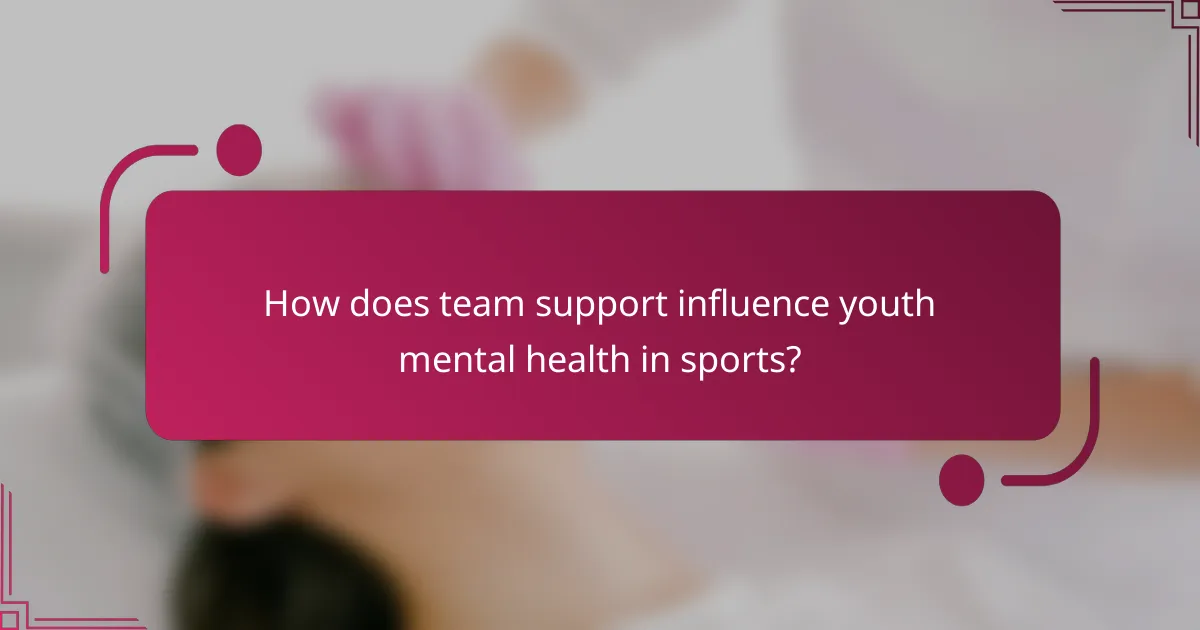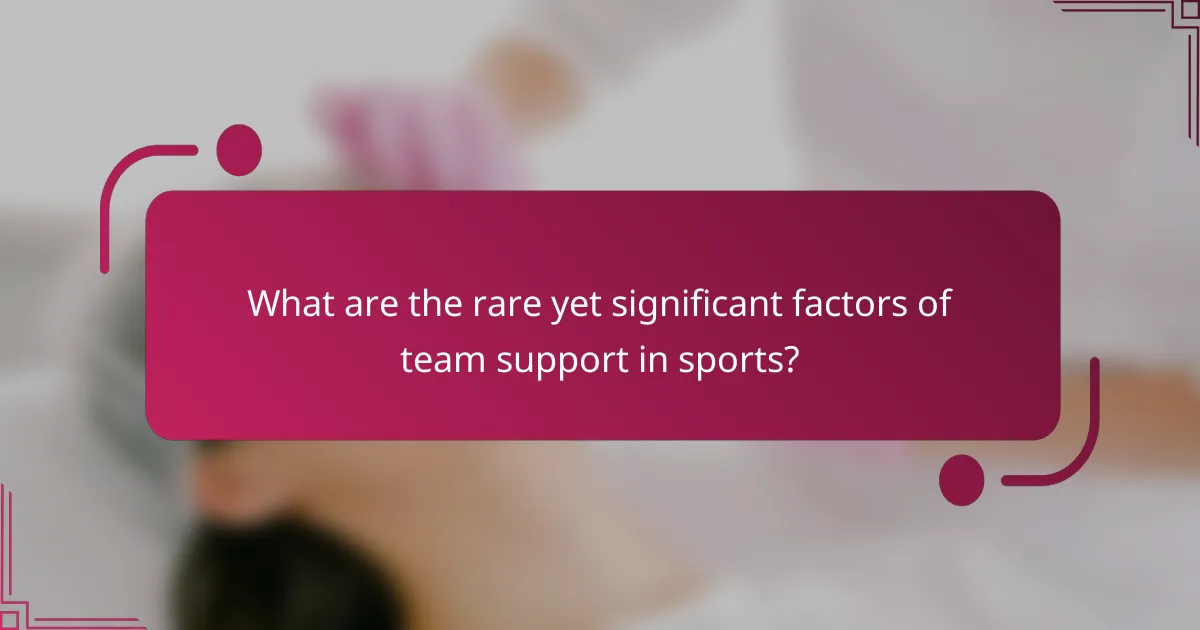Team support plays a crucial role in enhancing youth mental health in sports by fostering belonging and reducing isolation. Strong team dynamics promote emotional resilience and improve self-esteem. Coaches can create open communication environments and implement mental health education programs. Actionable steps, such as team-building activities and access to resources, further contribute to healthier mental states for young athletes.

How does team support influence youth mental health in sports?
Team support significantly enhances youth mental health in sports by fostering a sense of belonging and reducing feelings of isolation. Strong team dynamics promote emotional resilience, which is crucial during challenging times. Research indicates that youth involved in supportive sports environments experience lower levels of anxiety and depression. Moreover, positive interactions with coaches and peers can lead to improved self-esteem and motivation. Ultimately, team support serves as a protective factor, encouraging healthy coping strategies and emotional well-being in young athletes.
What are the psychological benefits of team support?
Team support significantly enhances youth mental health in sports by fostering a sense of belonging and reducing feelings of isolation. This support can improve self-esteem and resilience, leading to better emotional regulation. Research shows that youth involved in supportive teams experience lower levels of anxiety and depression. Additionally, team camaraderie can promote positive coping strategies, enhancing overall well-being. The unique attribute of team support lies in its ability to create a shared identity, which is critical for emotional development in young athletes.
How does teamwork affect emotional resilience in young athletes?
Teamwork significantly enhances emotional resilience in young athletes by providing essential support and camaraderie. Collaborative environments foster trust, shared experiences, and coping strategies among team members. As a result, young athletes develop stronger emotional stability and adaptability in challenging situations. Studies indicate that athletes engaged in team sports report higher levels of mental well-being compared to those in individual sports. This collective support system acts as a buffer against stress and anxiety, ultimately promoting healthier mental health outcomes.
What role does communication play in team dynamics?
Effective communication fosters collaboration and trust, enhancing team dynamics in sports. It enables youth athletes to express concerns, share ideas, and build relationships, crucial for mental health support. Open dialogue promotes a sense of belonging, reducing feelings of isolation. Furthermore, effective communication helps coaches and teammates recognize emotional cues, allowing timely interventions. This interconnectedness ultimately contributes to a supportive environment that enhances youth mental well-being in sports.
How can shared goals enhance mental well-being?
Shared goals significantly enhance mental well-being by fostering a sense of belonging and purpose among youth in sports. Team support promotes collaboration and reduces feelings of isolation. Engaging in shared objectives encourages communication, builds trust, and enhances resilience. Research indicates that youth involved in team sports experience lower levels of anxiety and depression, attributed to the social connections formed through shared aspirations. Ultimately, these positive interactions contribute to improved mental health outcomes.
What unique aspects of team support impact youth mental health?
Team support significantly enhances youth mental health in sports through emotional, social, and psychological aspects. A supportive team environment fosters a sense of belonging, reducing feelings of isolation. This connection can improve self-esteem and resilience among young athletes.
Unique aspects of team support include shared experiences and collective achievements, which promote camaraderie and a positive group identity. These factors can lead to increased motivation and a commitment to mental well-being.
As a result, teams that prioritize mental health support can help youth navigate challenges, both in sports and life. Encouraging open communication and peer support within teams can create a safe space for discussing mental health issues.
How does the presence of mentors within a team shape mental health outcomes?
Mentors within a team significantly enhance youth mental health outcomes in sports. Their presence fosters a supportive environment, which can reduce stress and anxiety among young athletes. Mentors provide guidance, promote resilience, and encourage open communication, all contributing to improved mental well-being. Studies indicate that youth who engage with mentors report higher self-esteem and lower rates of depression. This mentorship dynamic creates a unique attribute of emotional safety that is crucial for healthy development in competitive sports settings.
What are the effects of peer relationships on young athletes’ mental health?
Peer relationships significantly enhance young athletes’ mental health by providing emotional support and fostering a sense of belonging. Strong team dynamics lead to increased self-esteem and resilience, which are crucial during competitive pressures. Research indicates that athletes with supportive peers experience lower levels of anxiety and depression. Additionally, these relationships promote positive coping strategies, helping young athletes navigate challenges effectively. Overall, team support plays a vital role in nurturing mental well-being in sports.

What are the rare yet significant factors of team support in sports?
Rare factors of team support in sports significantly impact youth mental health. These include emotional resilience, social cohesion, and a sense of belonging. Emotional resilience fosters coping strategies in challenging situations. Social cohesion enhances teamwork and reduces feelings of isolation. A strong sense of belonging promotes self-esteem and encourages participation, leading to improved mental well-being. These unique attributes create a supportive environment that nurtures youth athletes’ mental health.
How does cultural background influence team support dynamics?
Cultural background significantly shapes team support dynamics, impacting youth mental health in sports. Diverse cultural perspectives foster empathy and understanding among team members, enhancing communication. For instance, teams with varied cultural backgrounds often exhibit stronger support systems, as members draw from different experiences. This inclusivity can lead to improved mental well-being and resilience in young athletes. Additionally, cultural norms influence how support is expressed, with some cultures emphasizing collective encouragement. Understanding these dynamics is crucial for coaches and sports organizations aiming to create supportive environments that prioritize mental health.
What uncommon challenges do diverse teams face in supporting youth mental health?
Diverse teams face challenges in supporting youth mental health due to varying communication styles and cultural perspectives. Misunderstandings can arise from different backgrounds, impacting team cohesion. Additionally, team members may have unique approaches to mental health, leading to conflicting strategies. This diversity, while beneficial, can complicate consensus-building on best practices. Effective training and open dialogue are essential to navigate these complexities and enhance support for youth.

How can coaches effectively foster team support for mental health?
Coaches can effectively foster team support for mental health by creating an open environment for communication. Encouraging players to share their feelings promotes trust and reduces stigma. Regular team-building activities can strengthen relationships, enhancing emotional support. Training sessions on mental health awareness equip athletes to recognize signs of distress in teammates, fostering a supportive culture. Implementing check-ins before and after practices allows coaches to gauge mental well-being, ensuring players feel valued and understood.
What strategies can coaches implement to enhance team cohesion?
Coaches can enhance team cohesion by fostering open communication, promoting trust, and encouraging collaboration. These strategies create a supportive environment, crucial for youth mental health in sports.
Open communication allows players to express feelings and concerns, reducing anxiety. Trust-building activities, such as team-building exercises, strengthen relationships among team members. Encouraging collaboration through shared goals fosters a sense of belonging and unity, essential for mental well-being.
Additionally, recognizing individual contributions can boost self-esteem and motivation. Coaches should also facilitate conflict resolution to maintain a positive atmosphere. By implementing these strategies, coaches can significantly improve team cohesion, benefiting both performance and mental health.
What common mistakes do coaches make in supporting youth mental health?
Coaches often overlook the importance of open communication and emotional support for youth mental health. They may focus too heavily on performance, neglecting players’ emotional well-being. Additionally, coaches might fail to recognize signs of mental distress, leading to inadequate support. They can also inadvertently create a competitive atmosphere that discourages vulnerability, which is crucial for mental health. Lastly, some coaches may lack training in mental health awareness, limiting their ability to provide appropriate resources and support.
How can coaches balance competitiveness with mental health considerations?
Coaches can balance competitiveness with mental health by fostering a supportive team environment. Prioritizing open communication encourages athletes to express their feelings. Incorporating mental health education helps athletes understand their emotional well-being. Additionally, recognizing individual achievements, regardless of competition outcomes, promotes a positive atmosphere. This approach nurtures resilience and reduces stress among youth athletes, enhancing both performance and mental health.

What actionable steps can teams take to support youth mental health?
Teams can take several actionable steps to support youth mental health in sports. First, foster open communication to create a safe environment. Encourage players to express their feelings and concerns without fear of judgment. Second, implement mental health education programs that teach coping strategies and stress management techniques. Third, provide access to mental health resources, such as counselling or workshops, tailored for young athletes. Lastly, promote a culture of inclusivity and teamwork, which can enhance social support and belonging among youth. These steps collectively contribute to a healthier mental state for young athletes.
What best practices should teams adopt for mental health support?
Teams should adopt open communication, training for coaches, and mental health resources to support youth mental health in sports. Open dialogue fosters trust, allowing athletes to express their feelings. Training equips coaches with skills to recognize mental health issues. Providing resources, such as access to counselling, ensures athletes receive necessary support. These practices create a supportive environment that prioritises mental well-being.
How can teams create a supportive environment for young athletes?
Teams can create a supportive environment for young athletes by fostering open communication, encouraging teamwork, and prioritising mental health. Establishing trust allows athletes to express concerns and seek help. Promoting positive reinforcement builds confidence, while inclusive practices enhance belonging. Regular mental health check-ins help identify challenges early, ensuring athletes feel valued and supported. Creating a culture that emphasises balance between competition and personal growth contributes significantly to youth mental health in sports.
What resources are available for teams to enhance mental health support?
Teams can access various resources to enhance mental health support for youth in sports. Key resources include training programs for coaches, mental health workshops, access to counsellors, and online platforms offering mental health tools.
Training programs equip coaches with skills to recognise mental health issues and provide appropriate support. Workshops focus on building resilience and coping strategies among young athletes. Access to professional counsellors ensures that athletes receive specialised help when needed. Online platforms can offer anonymous support and educational materials, making mental health resources more accessible.
Incorporating these resources fosters a supportive team environment, essential for improving youth mental health in sports.